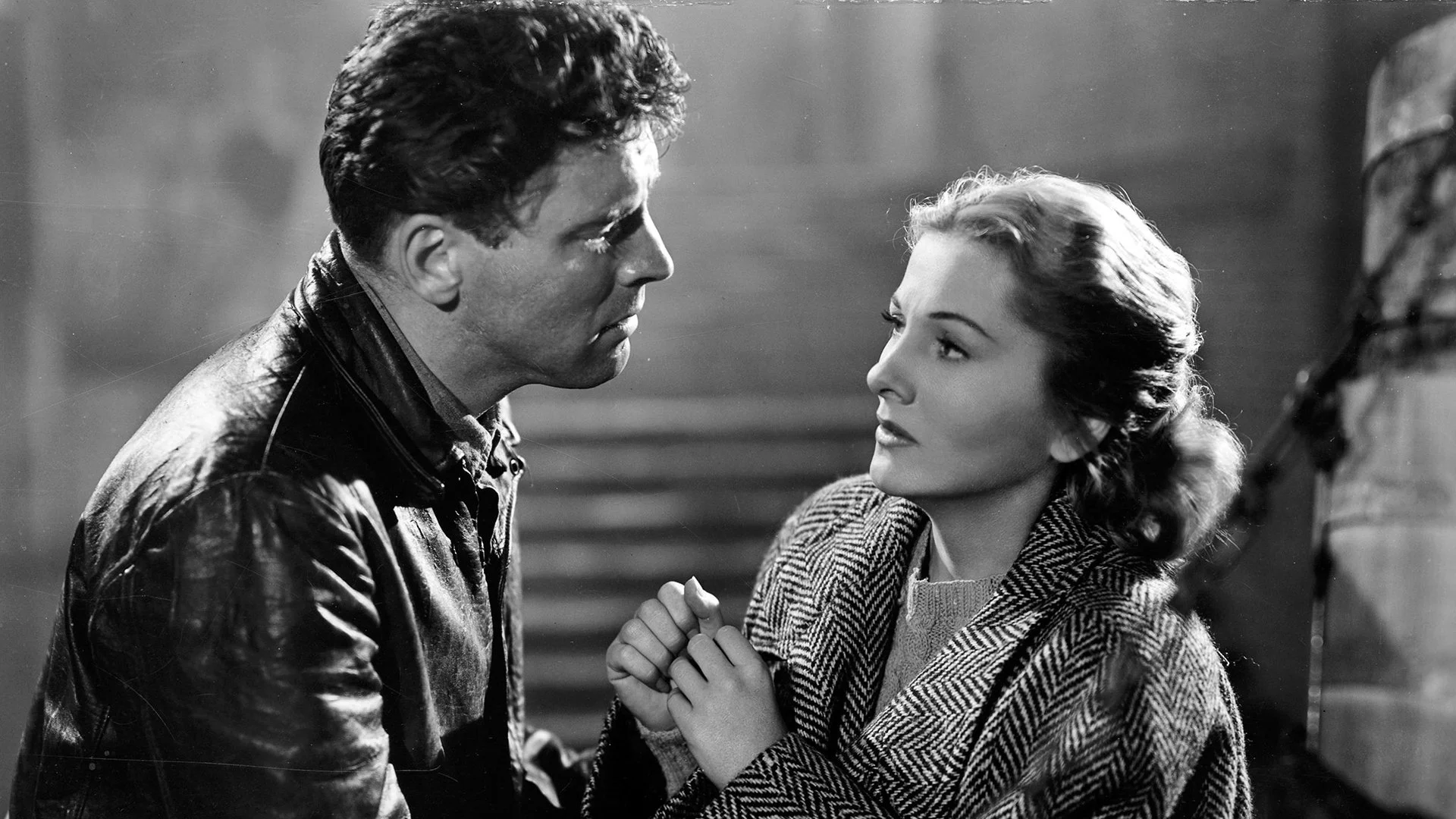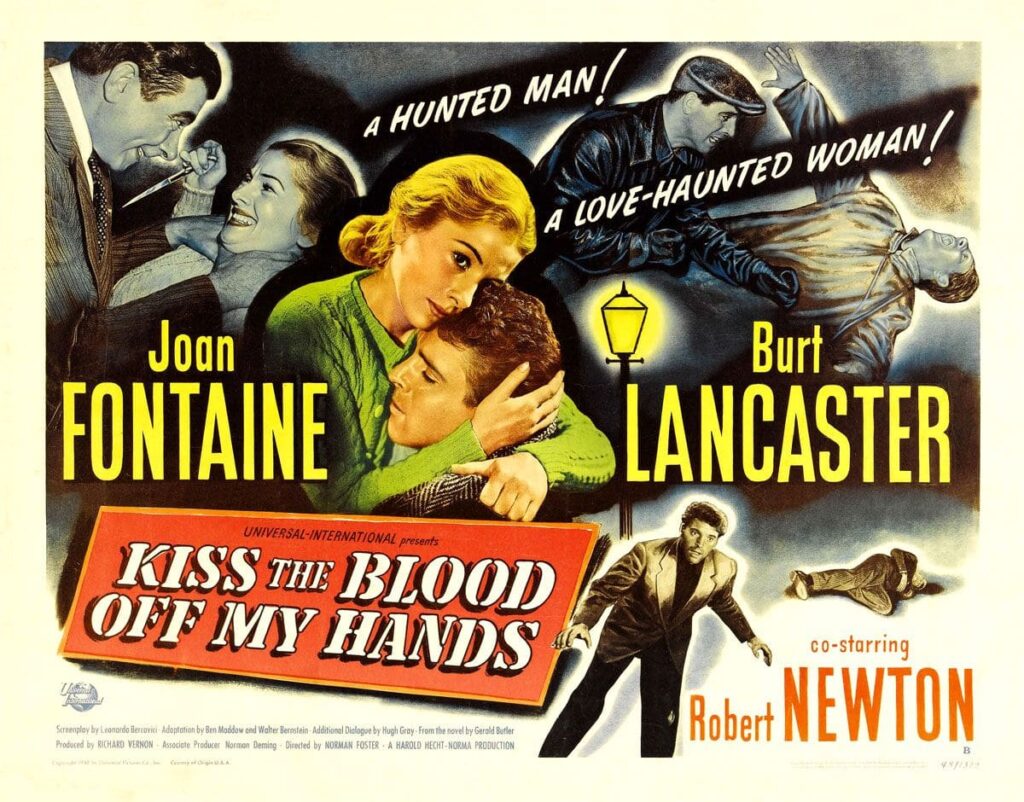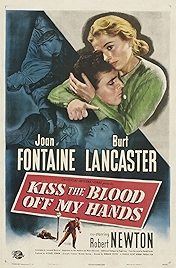The title of the movie Kiss the Blood Off My Hands makes a promise that can’t be fulfilled. An attention grabber, even before it had debuted there was talk of changing it, to Blood on My Hands (which is how the film is listed on the IMDb). In some parts of the USA it went out as the even more timid The Unafraid. Dramatic though the original title is, it’s all wrong for a story about an accidental killer and his gal and is more suited to a lurid 1960s shocker or a 1980s video nasty than a 1948 melodrama.
It’s the first in a long string of fascinating movies made by Burt Lancaster’s production outfit, which went by a string of different names, depending on who he was partnering. Here it’s Hecht/Norma Productions, after business partner and agent Harold Hecht, and Norma, Lancaster’s wife.
Lancaster gives top billing to Joan Fontaine. It might look like gallantry but in fact she was the bigger name. Lancaster had only been a bona fide star since The Killers propelled both him and Ava Gardner to instant celebrity in 1946. Since then he’d made six more movies, making this his eighth in two years. Strike while the iron is hot.
As was often the case with Lancaster productions, he plays a more complex character than Hollywood usually dealt with, a hothead who lashes out in a London pub one night at closing time (never in the history of recorded time has a London pub ever emptied so fast) and accidentally kills the landlord.
On the run, Lancaster first puts on a box-office-baiting display of his own athleticism, vaulting over, under and through obstacles, until Bill eventually climbs into the window of solid, decent medico Jane (Fontaine) and hides out there till morning. By which time he’s smitten, not least on account of Jane’s ballsiness. She might also be smitten too.
Maybe this is a love story and they could have some kind of a life together. Maybe Bill should give himself up to the police and throw himself on their mercy. Maybe a witness to the misadventure, Harry Carter (Robert Newton), won’t catch up with Bill and start putting the squeeze on him, forcing him eventually to help Carter steal a consignment of vaccines meant to keep children safe from the scarlet fever epidemic raging through the country.
It’s fraught, emotional, high-stakes stuff, the sort of movie you can imagine watching in a barely occupied cinema on a wet Thursday afternoon as Lancaster and Fontaine’s faces loom massively on the screen, lips all-aquiver, waiting for fate’s next card to be dealt.
Like the title, it’s simultaneously glorious and ridiculous, but there is nuance, in Bill’s character at least. He may be an unlucky innocent as regards the pub killing, but Bill’s also a man with a violent side, a man liable to strike out wildly when the red mist descends, as it does easily. The first “date” he goes on with Jane (he’s actually kind of stalking her, but hey) is to a zoo. But the wild beast to be tamed is not in a cage. Dot dot dot.
Fontaine puts a spine into her performance of Jane, who for all her early assertions of independence, is written as a bit of a doormat. Newton, one year after being Bill Sikes in David Lean’s Oliver Twist, is more or less giving us Sikes Mark II, a Cockney geezer with a pitch black heart, a variable accent and all the winking and gurning that almost always comes with a Newton performance (see all those Long John Silvers).
It’s superbly made. In a studio in LA rather than on the streets of London where it’s set but it allows director Norman Foster to give free rein to the stark lighting of DP Russell Metty, of Touch of Evil, The Misfits and Imitation of Life (the Douglas Sirk one) fame. And the Miklós Rózsa score does exactly what it’s meant to, surging and swelling, soaring and diving as the melodrama builds up a head of steam, insisting that what’s going on up there on the screen is highly dramatic when in fact it isn’t. This is the story of an accident not of a tragedy.
Modern relevance can be found in a very brief subplot about an antivaxer resisting a scarlet fever jab for his daughter. And historical relevance comes when Bill is jailed for an unrelated crime of violence and gets 18 lashes as punishment. 1948 was the last year in the UK that the cat o’ nine tails would be used as a judicial punishment.
The film did OK business. Promising audiences violence, romance and redemption, it delivered on all three. There’s even, of sorts, a happy ending, or as happy an ending as a Code-era Hollywood movie could allow.
Kiss the Blood Off My Hands – Watch it/buy it at Amazon
I am an Amazon affiliate


